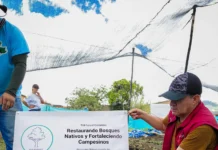
Algarve Tourism has promoted a set of initiatives aimed at addressing the issue of water shortage that has been affecting the region, and actively involving all stakeholders linked to the region’s tourism, including companies and sector agents, as well as tourists and residents.

It includes the creation of the new “Save Water” seal, a tool aimed at mobilising tourism companies in the Algarve to implement more conscious water consumption practices, ensuring their water efficiency and greater environmental sustainability in the region.

Promoted in partnership with Turismo de Portugal and ADENE – the Energy Agency, this seal is awarded to companies willing to comply with an action plan consisting of a set of prioritised or structuring measures aimed at promoting greater water savings.
Examples of these measures include replacing showers, faucets, or toilets with more efficient models, reducing watering of green spaces, choosing plant species adapted to the Algarve climate, or suspending the operation of lakes and ornamental fountains.
By joining this initiative, companies also commit to monitoring water consumption, overseeing the implementation of the measures, and sharing and encouraging the adoption of best practices for saving this vital resource among employees and customers.
Through this voluntary commitment and as a result of joint efforts, the tourism sector aims to contribute to reducing urban water consumption in the destination by 15% by the end of the year. So far, 25 hotels have already joined this initiative and are following the necessary procedures to display the “Save Water” seal.
‘Save Water, be a Futurist’, is the motto of the jointly promotional campaign with Turismo de Portugal that aims to raise awareness whilst challenging tourists to be an active part of the water-saving commitment during their visit to the Algarve. With this campaign, travellers are invited to experience the destination and their holidays in a more conscious and responsible way, involving them in nature conservation and balanced use of natural resources such as water.




